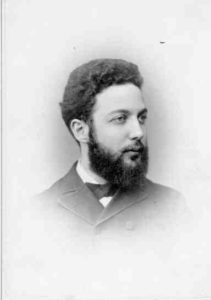Rabbi David Philipson: A Voice in Opposition
A member of the first graduating class of Hebrew Union College (HUC), David Philipson (1862-1949) attended HUC following a direct invitation from Rabbi Isaac M. Wise. Born to German-Jewish immigrants in Wabash, Indiana, Philipson proved a prominent scholar. He spoke six languages, including: English, Hebrew, German, Arabic, Aramaic and Amharic. Perhaps you have heard of the notorious Trefa Banquet? This sumptuous dinner, held on 11 July 1883 to honor the first graduating class of HUC, had Philipson in attendance.
After graduating from HUC, Philipson began his rabbinical career at the Har Sinai Congregation in Baltimore before returning to Cincinnati in 1888. Back in Cincinnati, Philipson assumed the pulpit at the Bene Israel Congregation, where he taught in both the congregation’s religious school and at the Hebrew Union College. Philipson authored several books, though most famously, “The Reform Movement in Judaism.”
Philipson garnered national attention for his pioneering interfaith work, enmity towards anti-Semitism, and adamant anti-Zionism, but his beliefs were at odds with many other rabbis and Jewish leaders of his time. While Philipson became the first Jew to speak publicly at an Episcopalian chancel, accentuating his belief in interfaith work, he also wrote vigilantly against American imperialism, partnering with Hon. Rufus Smith and (the future president) William Taft to fill the pages of The Cincinnati Enquirer with columns preaching anti-imperialism. His sermons, as well, were politically-minded and often controversial. Philipson opposed Zionism on the grounds that to be a Jew meant only to believe in the faith, and not to adopt a nationalist mindset.
Throughout the years of WWI, Philipson proliferated to local politicians that the American Jewish community was not sympathetic to the German cause. In 1927, when the Queen of Romania traveled to the United States and invited the religious and political leaders of Cincinnati to join her for a meal, Philipson earned national attention for refusing to join her; he based his refusal on the ongoing pogroms in her country.
In later years, Philipson retired in many ways from public life; however, his seclusion did not prevent him from assisting in the organization of a 1933 anti-Nazi protest, nor from urging in 1940 for the United States to join the war against Nazi Germany.

Image of Rabbi David Philipson, undated. PC-3468a. American Jewish Archives, Cincinnati, Ohio.

